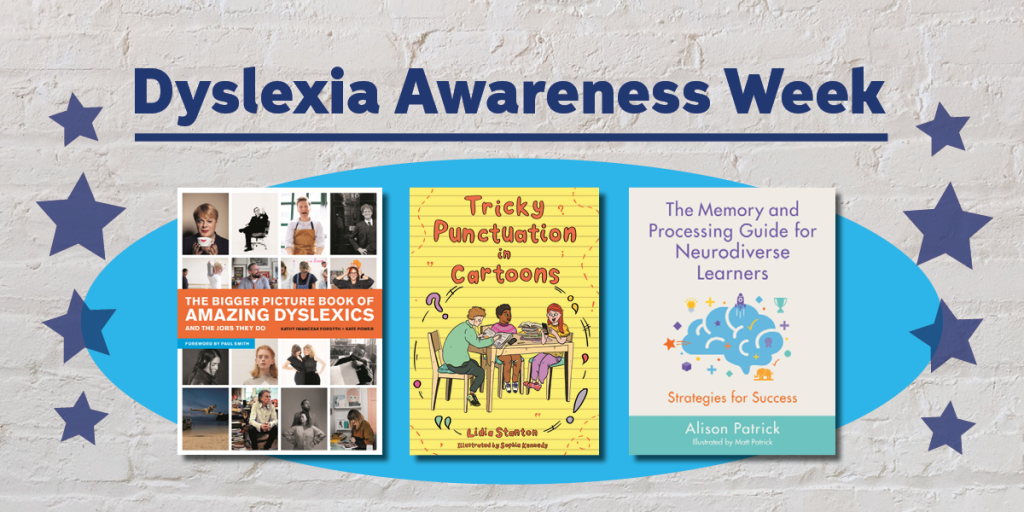
Alison Patrick is the author of The Dyspraxic Learner and The Memory and Processing Guide for Neurodiverse Learners and is trained as a SpLD teacher, specialising in teaching dyspraxic learners. She has several years’ experience working with dyspraxic students, and has researched extensively into this fascinatingly complex area and managing dyslexia in the classroom.
- There are good days and bad days for pupils with dyslexia. Plenty of factors can contribute to a bad day in the classroom: excitement, anxiety or plain lack of sleep. Reading, spelling, writing, remembering; all these things will be more difficult on a bad dyslexia day. On a good dyslexia day in the classroom, more will be learned and progress will be made.
- Dyslexia isn’t only in the classroom and doesn’t end when school finishes for the day. After an exhausting day at school, dyslexia doesn’t have a break and homework can be a struggle too. Daily life requires a lot of reading and dyslexia is ever present in shops, on public transport and even when a new recipe is being cooked. Luckily, respite comes with socializing, creativity and sport.
- Good things come with dyslexia too and there are strengths to be applauded and enjoyed. Pupils with dyslexia can bring problem solving skills and inventiveness to group work, at school and in working life too.
- People with dyslexia are creative and when creativity is discouraged or dismissed as futile by others, it can literally thwart the life of someone with dyslexia.
- Assistive technology is great for dyslexia. There are so many aids for dyslexia in the classroom and even a fairly minor adjustment can make a big difference. Listening to a set text first before reading it can aid understanding ready for future study. Writing can benefit from a technological boost with dictation software, allowing a dyslexic pupil with writer’s block to talk their thoughts onto the computer. There is some great assistive technology to be used. One of my favourites is My Study Bar, bringing audio, dictation and mind mapping help to dyslexic students.
- Working memory difficulties and dyslexia go hand in hand. I don’t think I have ever worked with dyslexia without seeing a weakness in working memory. For this reason, it can be stressful for a dyslexic person to be asked to think about too many things at once. Learning will be enhanced by reinforcement of new information to get it into the long-term memory. Visual and auditory memory strategies can make a big difference to classroom learning and revision for exams. Online platforms eg. Kahoot, Quizlet and Quizziz can reinforce learning in a fun way. This can make a really big difference when learning for formal exams begins.
- Disorganisation and dyslexia also go hand in hand. Organisation can be very tricky for pupils with dyslexia. Although disorganisation is often a dyslexic ‘thing’, some people with dyslexia are super organized (and quite stressed out too). Organisation strategies can be massively helpful but they need to target specific areas e.g. homework, bag packing, time keeping.
- Self-esteem can get crushed early on at school. At the stage when classmates are learning to read, buoyant, confident dyslexic children can begin to languish because they sense that they are not picking up a key skill as quickly as their peers. Not only is this frustrating but it can be terrible for self-esteem too. And once badly knocked, self-esteem difficulties tend to be established for life. These dyslexic children can literally get left behind if they don’t get extra literacy support inside and outside school.
- 1:1 support is really important. I always notice when a teenager with dyslexia has had 1:1 literacy support when they were younger and still uses the reading techniques. 1:1 support can be literally life changing for learners of all ages with dyslexia, allowing for specific focus on their dyslexia and strategies to aid them with their learning.
- Dyslexia can be a friend or a foe depending on how it is treated. I have observed that students with dyslexia carry it like a daemon (the animal soul companion from Philip Pullman’s trilogy of fantasy books). Some are at ease with their dyslexia and carry it comfortably but others have a daily tussle with it and it is an unwelcome intruder in their lives. If dyslexia isn’t properly supported in the classroom, then it can become an unwelcome companion and this can have a negative and lifelong impact. If dyslexia is supported properly then tactics can be used to moderate difficulties, and the positives that inevitably accompany dyslexia can be fully embraced.
If you would like to read more articles like this and get the latest news and offers on our books, why not join our mailing list? We can send information by email or post as you prefer. You may also be interested in liking our Special Education and PSHE Facebook page.